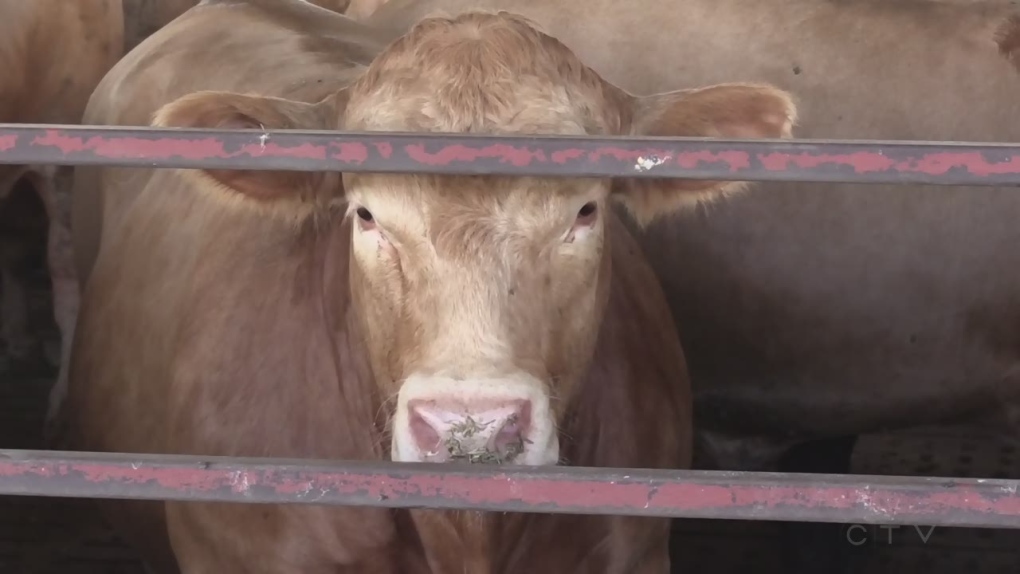'Among the worst I've seen': More than 200 cows seized from Vancouver Island property for neglect

The BC SPCA says more than 200 beef cattle were seized from a Vancouver Island property after the owner reportedly left them in distressing conditions.
A total of 216 cows, including approximately 80 calves, were seized from the property on Wednesday and Thursday.
The BC SPCA was granted a warrant to remove the animals after the cows were found to be in poor condition, with issues at the property including lack of sufficient feed and water, lack of veterinary care, inadequate shelter, and poor living conditions – including areas where some cows were being kept in knee-deep mud, according to the SPCA.
BC SPCA’s regional manager of cruelty investigations, Kaley Pugh, says the living conditions were "among the worst” she’s ever seen.
"The animals were suffering from a wide range of issues and illness, including emaciation, lameness, eye infections, as well as pneumonia," Pugh said in a release Friday.
The 216 cows are now being cared for at an undisclosed location, where they are receiving veterinary care.
The BC SPCA says it's grateful to everyone who assisted in finding and relocating the cattle.
"We received invaluable help from the Malahat Fire Department, which brought a tanker truck to the location to fill water troughs," said Pugh.
"We also received assistance from the B.C. Dairy Association, who helped us access many of the resources we needed for such a large seizure, and tremendous help from the haulers who worked tirelessly to ensure the cattle were loaded and transported safely under extremely challenging circumstances," she said.
The BC SPCA is recommending charges of animal cruelty to Crown counsel.
CTVNews.ca Top Stories

'A beautiful soul': Funeral held for baby boy killed in wrong-way crash on Highway 401
A funeral was held on Wednesday for a three-month-old boy who died after being involved in a wrong-way crash on Highway 401 in Whitby last week.
Police handcuff man trying to enter Drake's Toronto mansion
Toronto police say a man was taken into custody outside Drake's Bridle Path mansion Wednesday afternoon after he tried to gain access to the residence.
U.S. presidential candidate RFK Jr. had a brain worm, has recovered, campaign says
Independent U.S. presidential candidate Robert F. Kennedy Jr. had a parasite in his head more than a decade ago, but has fully recovered, his campaign said, after the New York Times reported about the ailment.
Blind Sask. boy heading to international braille competition hopes to increase accessibility for visually impaired
A Saskatchewan boy who qualified for an international braille competition in Los Angeles next month hopes he can inspire change in his home province.
'A step forward': New screening criteria for sperm donors takes effect
Canadians looking to grow their families with the assistance of sperm or egg donations should soon have more options for donors as the federal health agency does away with longstanding restrictions criticized as discriminatory.
Ontario Provincial Police arrest 64 suspects in child sexual exploitation investigation
Ontario Provincial Police say 64 suspects are facing a combined 348 charges in connection with a series of child sexual exploitation investigations that spanned the province.
What is whooping cough and should Canadians be concerned as Europe declares outbreak?
There is currently a whooping cough epidemic in Europe, with 10 times as many cases compared to the previous two years. While an outbreak has not been declared nationwide in Canada, whooping cough is regularly detected in the country.
Pfizer agrees to settle more than 10K lawsuits over Zantac cancer risk: Bloomberg News
Pfizer has agreed to settle more than 10,000 lawsuits about cancer risks related to the now discontinued heartburn drug Zantac, Bloomberg News reported on Wednesday, citing people familiar with the deal.
Steve Albini, legendary producer for Nirvana, the Pixies and an alternative rock pioneer, dies at 61
Steve Albini, an alternative rock pioneer and legendary producer who shaped the musical landscape through his work with Nirvana, the Pixies, PJ Harvey and more, has died. He was 61.
































